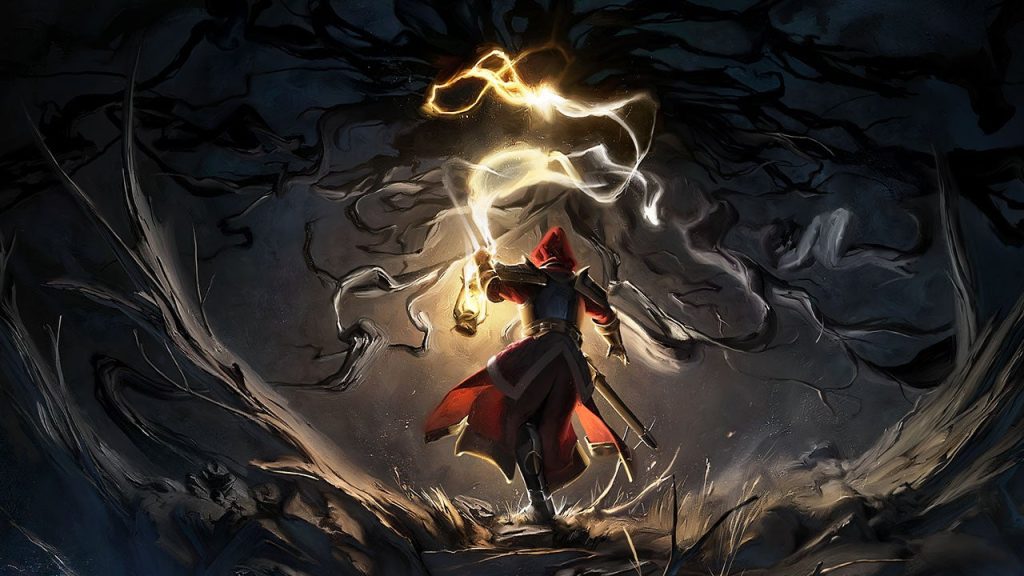After spending around six hours navigating the dark fantasy world of Mandragora: Whispers of the Witch Tree, I find myself both fascinated by its intricacies and concerned that the combat—central to its supposed 40-hour journey—might become repetitive. The narrative is compelling, filled with grotesque monsters, a sinister society ruled by unsettling characters, and choices designed to make you uncomfortable. However, in between trips to towns and conversations with my expanding party at camp, I’ve been engaging in fights that lack novelty and are not particularly challenging. While it’s premature to conclude, this could pose a significant issue for an action-RPG that draws inspiration from soulslike elements.
Ah, the age-old question: “Is this a soulslike?” Given the tendency for many games in 2025 to fit that label, it seems likely. Do genre classifications even matter? Not really. Regardless, Mandragora certainly incorporates familiar mechanics like save points that respawn enemies, formidable bosses, and a leveling currency that can be lost permanently upon death if not retrieved. Additionally, it features elements of 2D platforming, exploration, intricate skill trees for each of its six character classes, and a robust equipment and crafting system, firmly placing it in the action-RPG category. The gameplay revolves around wielding melee weapons, dodging attacks, casting spells, and traversing gaps with a grapple hook.
As you explore, you’ll become acquainted with Faelduum, the grim world of Mandragora plagued by malevolent creatures that force humanity behind city walls. You take on the role of an inquisitor involved in a witch hunt, seeking out evils to destroy while being haunted by the whispers of a sympathetic monster you inadvertently harmed (there’s a backstory there). I’m unsure where this narrative thread will lead, but I find the setup intriguing, even though I’ve grown somewhat weary of dark fantasy settings in general.
Having played numerous soulslikes in recent years, many of which heavily indulge in creepy fantasy themes, I feared Mandragora would be just another reiteration. This concern has proven unnecessary; I am impressed with the depth of Faelduum, its diverse cast of characters, and the morally complex decisions presented to me. My curiosity extends to why witches have transformed from traditional figures into grotesque flesh monsters, how this world has succumbed to evil while humans cower in unjust ruins, and the implications of my character absorbing dark energy known as Entropy—something that likely won’t end well for him.
I’ve been impressed with this world and the characters who occupy it.
The environments can appear somewhat generic while navigating, but Mandragora showcases a beautiful painterly art style in cutscenes and character interactions, reminiscent of animated portraits in a wizarding school. I’ve genuinely connected with the characters I’ve encountered, such as a reckless treasure hunter and a kind-hearted blacksmith, making their dialogue enjoyable and fueling my anticipation for the overarching story’s progression.
However, in terms of combat, I’ve primarily faced slow soldiers and easily defeated rats, leading to repetitive rolling and hitting patterns. The combat feels lacking, especially since I’ve already experienced repeated boss encounters within just a few hours—typically a bad sign for enemy variety. Yet, I’ve only tried out one of the six classes (a dual-bladed agility warrior), so it’s possible that I simply chose a less exciting option. With extensive skill trees and plenty of equipment to find and craft, there remains potential for a more engaging combat experience in future encounters.
As Mandragora is a side scroller, it offers a fair amount of platforming and secret exploration, but these moments have primarily served as brief respites between combat sequences. Early game has shown minimal puzzles or notable sections focused on dodging traps, although clear metroidvania hints suggest I’ll soon acquire new tools, like the anticipated grapple hook. I hope that upcoming gameplay elements will enrich this aspect of Mandragora.
Due to receiving the review code close to launch, the PlayStation dashboard indicates I’m only 20% into the campaign, with the Steam store page suggesting a 40+ hour story. Time will tell if the platforming and combat can match the quality of the narrative and art. For now, I’m enjoying the experience enough to continue, eager to discover what lies ahead, and considering the extensive RPG menus filled with possibilities, there’s still plenty to explore before my final review next week.



